This year, we celebrate the 76th anniversary of our independence on August 15. The theme for this year is “Nation First, Always First”, and it echoes a powerful message that resonates with each of us. To put the nation first, we ought to think of the future of our nation—our children.
Today as the fourth generation after independence, our collective memory of the struggle continues to diminish. As India marches into the future, we must not forget what united us, our roots – it is after all our rich history that has made us what we are today, a nation standing at the cusp of global greatness.
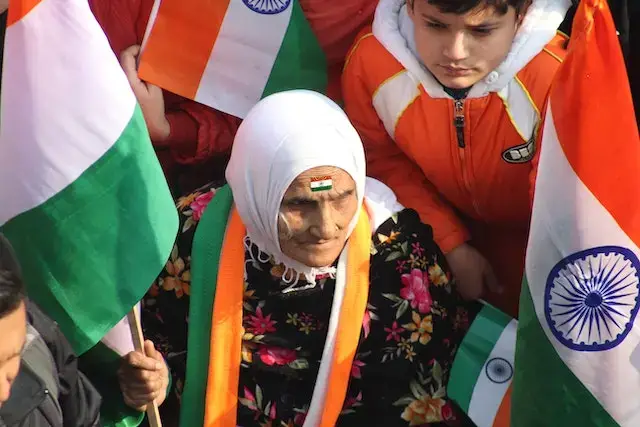
In today’s rapidly changing and interconnected world, nurturing love for the nation in our children has become more important than ever.
Let’s explore why and how we parents can instil a sense of national pride in our children.
Why is National Identity Important for Children?
A child feels safest when they’re assured that they belong. National identity is an important aspect of this sense of belonging. It instils in children a profound connection to their country, its history, culture, and values. Especially if you are a citizen of a country as diverse as India.
This is evident if you take a trip across India by train or bus. We all have, at one point in time, at least once undertaken such a journey to our native village or home town. The changing landscapes, the different foods, the languages and the people. And the deep feeling within our hearts that we too are a part of this rich tapestry of culture.
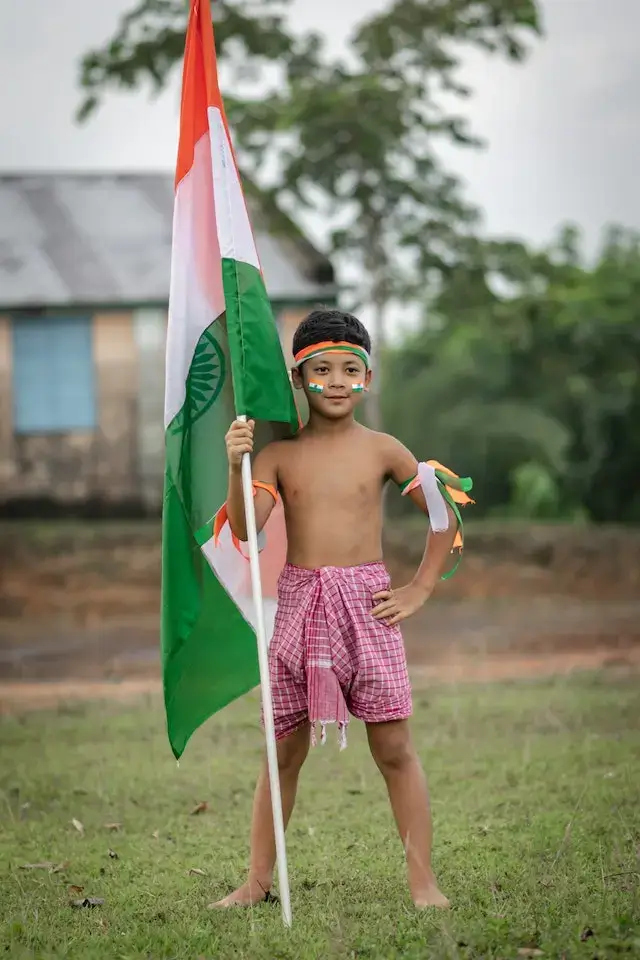
This is how some of us may have formed our national identity. The way we identify with our country is our national identity, the feeling that lets our hearts soar in pride.
Wouldn’t it be great if we could give and share this gift with our children?
As children grow, their national identity will shape their view of the world, influences their behaviour in society, and impacts their attitudes towards fellow citizens. It fosters pride in their country’s achievements and a deep understanding of the struggles that have shaped it.
Embracing national identity empowers children to appreciate, celebrate and be a part of the rich diversity that exists within our country, no matter where they are.
The Importance of Teaching National Pride to Kids
An essential aspect of their holistic development is teaching patriotism to kids. Fostering a sense of love and respect for our country instils a deep connection to their roots and heritage.
National pride promotes a strong sense of unity among kids, helping them overcome barriers of caste, creed, religion, and ethnicity. As they grow, this serves as a moral compass, guiding them towards responsible and informed decisions for the betterment of our nation.
Teaching national pride to children nurtures a sense of civic responsibility, encouraging them to participate in activities that contribute positively to our society.
By being active in public life and participating in activities for the communal good children, and adults, will feel a sense of accomplishment that is shared, developing a better understanding of civic responsibility and sense. They will experience ‘civics’ to be more than a school subject.
Children become better equipped to grow into empathetic and respectful citizens who place the interests of our nation first.
Building National Pride in Young Minds
As parents, we play an important role in nurturing a love for our nation in children and raising them to be patriotic citizens. By instilling national pride in children, we lay the foundation for future leaders who will prioritize our nation. Our actions will impact our children’s desire to make the country a better place for generations to come.
8 Parenting Tips to Instil Patriotism in Children
Here are some parenting tips on how to instil patriotism in children, teach them national pride, and build a strong national identity.
1. Parenting with Patriotism
Parents, we have the opportunity to shape our children’s tender minds. By embracing patriotism and teaching its importance, we can inspire our children to connect with our country’s history, culture, and values.
Nurturing a love for the nation in children goes beyond instilling a sense of allegiance; it’s about helping them understand what it means to be a responsible and compassionate citizen. This makes them more likely to show kindness toward others, regardless of their backgrounds.
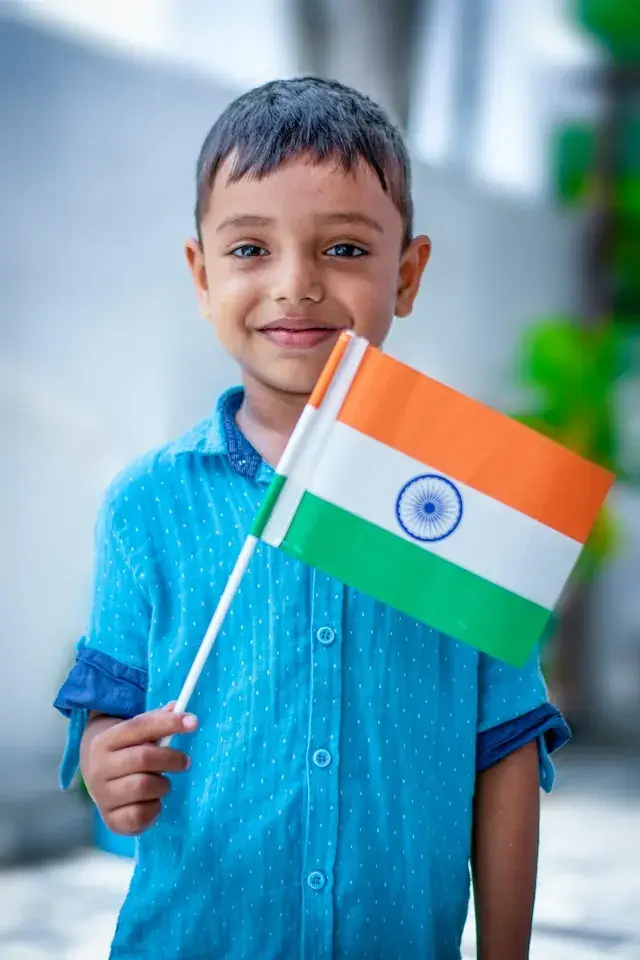
Explain to them what it means to be an Indian – tolerance, compassion, growth, peace, pride and so much more.
You can do this with activities like sharing stories, watching thoughtful movies together, speaking with the older generation about what their experience in old India was like and so on.
2. Fostering Love for the Nation Through Stories
Stories have the power to captivate young minds. Sharing inspiring tales of national heroes, freedom fighters, and their sacrifices is an engaging way to introduce children to the concept of patriotism. This method of nurturing a love for the nation in children leads to rewarding results.
My parents would tell us how, during the Indo-Pak war when they were school-going children they had to do Prabhat Pheri. This activity involved walking in groups in residential areas and singing patriotic songs. This not only instilled a sense of pride but also showed support for our troops protecting our borders.
A more recent example would be how we all got together on our balconies while in lockdown and made a clamouring noise to support the frontline Covid 19 warriors.
Be it the struggle for independence, tales of bravery, or acts of perseverance that reflect the spirit of the nation, storytelling leaves a lasting impact on children. When we share such stories, we ignite a spark of pride and admiration in our children’s hearts.
3. Engaging National Pride Activities for Kids
Learning about the country can be fun with creative and interactive activities. Family trips to historical sites, museums, and memorials can take children on an enjoyable journey. Encourage your children to participate in arts and culture competitions that celebrate the nation or organize small community events on days of national importance to instil a sense of pride and belonging.
You can watch patriotic movies together as well, movies like Swades, Rang De Basanti, Mission Mangal, Lakshya, Bhag Milka Bhag and the classics like Gandhi, Shaheed, Border and more.
Engaging in such activities not only builds their knowledge about the country and its people but also creates lasting memories.
4. Cultivating National Identity Through Volunteerism
Teaching kids the importance of giving back to the community goes a long way. Include them in appropriate volunteer activities such as cleaning up public spaces, helping the needy, or planting tr
Teaching kids the importance of giving back to the community goes a long way toward fostering a sense of responsibility towards our country. Include them in appropriate volunteer activities such as cleaning up public spaces, helping the needy, or planting trees.
This brings to mind the story of Afroz Shah, a young lawyer who began the beach cleanup movement. He decided to take on Versova Beach along with his 84-year-old neighbour Harbansh Mathur to begin cleaning the beach that was festering with ankle-deep garbage, filth and junk.
The first few weeks, they did it by themselves, picking one piece of trash at a time, and then people slowly began joining them. It turned into the world’s largest beach cleanup project that brought back a sense of belonging to the public. Today he has embarked on a new journey, to clean the Mithi River that runs through the city of Mumbai.

As they actively contribute to the betterment of their country, children will understand that every small act matters and that these little acts can make a big impact. By nurturing a spirit of volunteerism, we teach children the values of selflessness, cooperation, and the idea that they have the power to shape the future of our country.
5. Celebrating Diversity and Unity
India’s rich diversity is one of our greatest strengths. Encourage children to embrace and appreciate the cultures, languages, and traditions that coexist within the country. This way, they will learn that unity in diversity is what makes India unique.
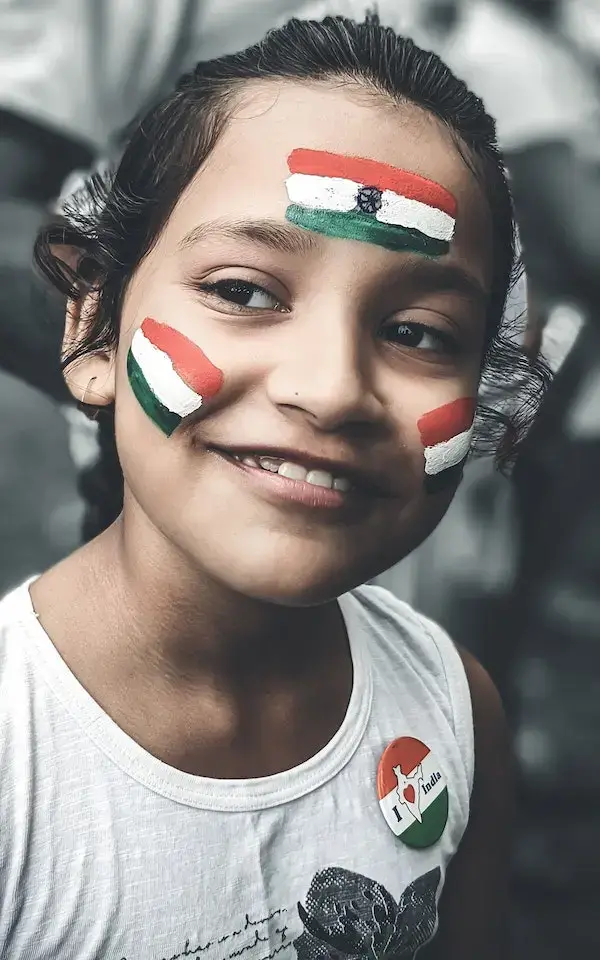
The easiest way to do this would be to participate in the flag-hoisting ceremonies and also watch the parade on TV. You can also get together and co-read a book on India or learn something new about another culture in India.
Here’s a fun thing my family does, we get together and prepare different meals from different cultures for lunch. It’s a simple yet fun way to celebrate the National holiday with your loved ones.
By celebrating various festivals and understanding different customs, children develop an open-minded outlook. They will contribute to a harmonious and inclusive society when they learn to respect and accept different perspectives.
6. Participating in National Events
As parents, we have the opportunity to make national events like Republic Day and Independence Day memorable occasions for the whole family. With children in tow, attend flag-hoisting ceremonies, cultural programs, and parades. Engage them in these events beforehand as well, by having them help in crafting decorations or practising for a performance.
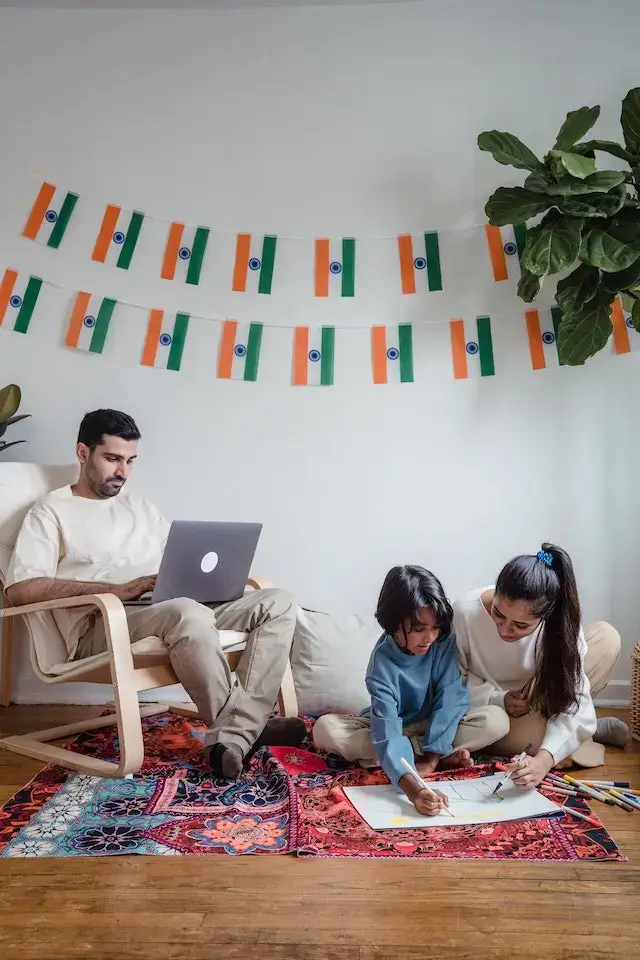
Active participation will help them understand the significance of these celebrations. The pride they feel when singing the national anthem during these events will leave a lasting impression. By involving them in the celebration of important national events, we help children develop a strong emotional connection with our country and our values.
7. Leading by Example
Children learn best through observation. Nurturing love for the nation in children starts by displaying your own love and respect for the nation through actions and words. Talk about your own experiences as an Indian citizen. This will inspire your children to follow suit and develop a sense of national pride.
The simplest way to do this is to volunteer or participate in activities that contribute to the nation’s good. Something as simple as donating blood while accompanied by your child can set the right example for them. Or hanging patriotic-themed decorations at home together while trading stories can make a great impression on the child’s mind.
Be a role model for your kids and show them how to respect and cherish the nation we call home.
8. Nurturing Positive Influences
In today’s age of technology and ease of access to media, children are exposed to various influences at a young age. Monitor their media consumption and ensure they engage with content that promotes positivity.
Encourage them to read books and watch shows that depict the nation’s values and history.
Teach children to question misinformation and develop critical thinking skills.
This is by far the best lesson we can give to our kids. There will always be trouble makers within the country who try to sway us from the right and moral path through misinformation and its .sensationalisation. You teach them critical and logical thinking skills and encourage them to ask the right questions. By doing so, you empower them to be smart and responsible digital citizens who can call out misleading information.
Parting Note
The journey of nurturing a love for the nation in children is not about being forceful or placing restrictions. It’s about celebrating the joy of being a part of our great nation. As parents, we hold the key to shaping our children into proud and responsible citizens. By incorporating these practical parenting tips, we can instil a sense of national pride in our children, teaching them the importance of their national identity and their role in building a better India.
Raising patriotic children begins by sowing the seeds of patriotism in their hearts and then watching as they grow into leaders who put the “Nation First, Always First.”
Happy Independence Day!

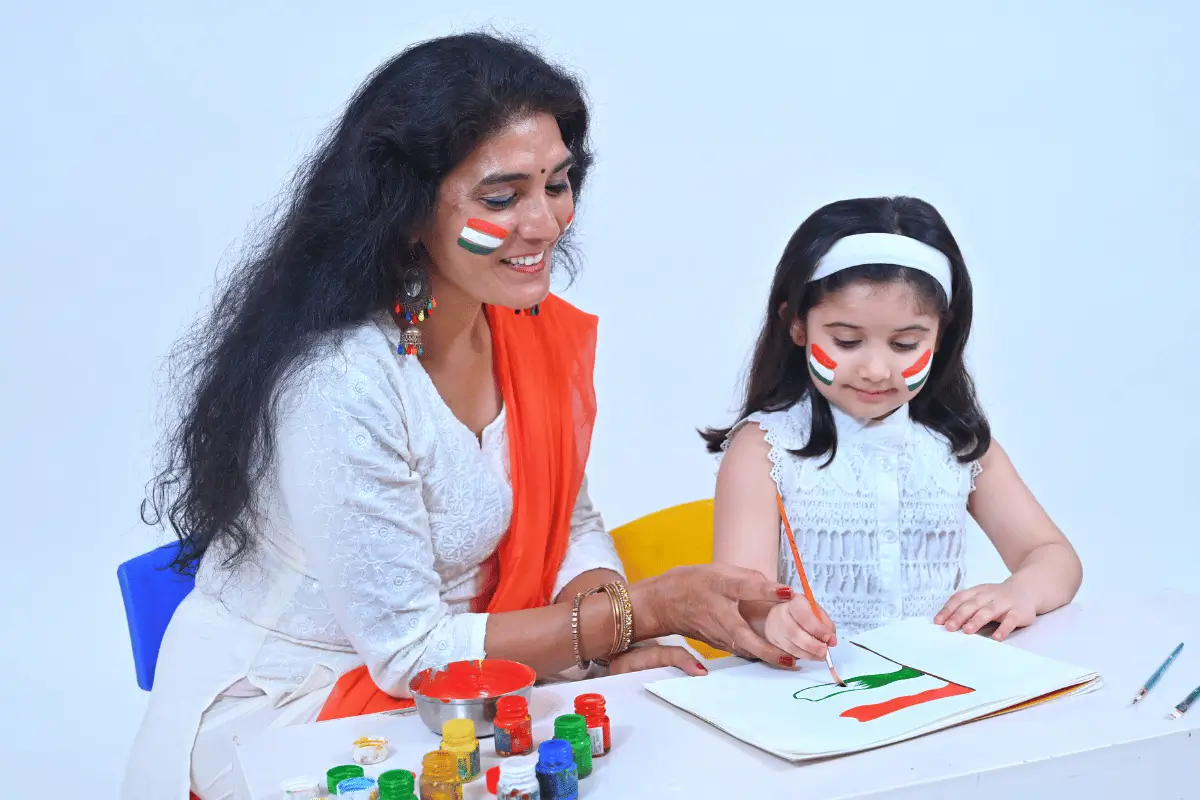

1 Comment